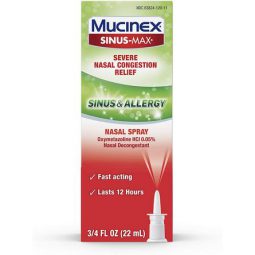
Mucinex Sinus Max is a vasoconstrictor nasal spray. The drug stimulates alpha-adrenergic receptors, therefore, when applied to the mucous membrane of the nose, it causes vasoconstriction, reduces edema and redness, and facilitates nasal breathing.
Indications
The spray is used to treat swelling of the nasal mucosa and mucous secretions.
Indications for use include:
- acute respiratory diseases;
- allergic rhinitis;
- vasomotor rhinitis;
- to restore drainage in case of sinusitis (inflammation of the paranasal sinuses) of the nose, otitis media, eustachitis;
- to eliminate edema before carrying out diagnostic manipulations in the nasal passages.
Contraindications
Mucinex Sinus Max is not used in any of the following condi-tions:
- allergy to the components of the solution;
- atrophic rhinitis;
- angle-closure glaucoma;
- surgical interventions on the dura mater;
- after transsphenoidal hypophysectomy;
- children under 6 years.
Use with caution:
- use of MAOIs, tricyclic antidepressants, broocriptine, as well as other drugs that increase blood pressure;
- pheochromocytoma;
- cardiovascular pathology (chronic heart failure, angina pectoris, arteri-al hypertension, arrhythmia, severe atherosclerosis, tachycardia);
- porphyria;
- metabolic disorders (hyperthyroidism, diabetes mellitus);
- prostatic hyperplasia with clinical symptoms (urinary retention);
- increased intraocular pressure;
- pregnancy, breastfeeding;
- chronic renal failure.
Pregnancy and lactation
Mucinex Sinus Max is used with caution during these periods.
How to use this spray?
Mucinex Sinus Max is used intranasally (in the nose).
The standard dose is 1-2 injections into each nasal passage up to three times a day.
It is not recommended to use the medicine for more than five days.
Overdose
When applied topically (intranasally), overdose is unlikely to occur.
Symptoms: convulsions, dilated pupils, nausea, cyanosis, fever, respiratory failure, cardiovascular disorders (arterial hypertension, tachycardia, arrhythmia), changes in consciousness, drowsiness, decreased body temperature, pulmonary edema, decreased heart rate, respiratory arrest, a sharp drop in blood pressure.
Treatment: stop using the spray, seek medical attention.
Contraindications for use
Inflammation of the mucous membrane of the nasal pas-sages without secretion, chronic heart failure, hyperthy-roidism, diabetes mellitus, pregnancy, hypersensitivity to oxymetazoline, atrophic rhinitis, lactation period, ar-rhythmias, severe atherosclerosis, arterial hypertension, CRF, angle-closure glaucoma.
Pregnancy and lactation
Oxymetazoline is contraindicated during pregnancy and lactation (breastfeeding).
Side effects
- Cardiovascular disorders: arrhythmia, rapid heartbeat, arterial hypertension;
- Neurological disorders: insomnia, headache, fatigue, dizziness;
- Respiratory disorders: shortness of breath, burning in the nose, feeling of dryness, sneezing, nosebleeds, increased swelling of the nasal mucosa, atrophy of the nasal mucosa;
- General: tachyphylaxis, drowsiness, fatigue, visual im-pairment;
- Digestive disorders: nausea;
- Immune disorders: manifestations of hypersensitivity (exanthema, angioedema, itching);
- Mental disorders: sleep disturbances, agitation, hallucinations.
Special instructions
Use the spray for no more than 3 days. Do not exceed the recommended dos-age. Avoid eye contact.
The drug affects vision and may reduce the reaction rate.
Drug interactions
Avoid using the nasal spray with:
- MAO inhibitors;
- tricyclic antidepressants;
- an increase in blood pressure;
- local anesthetic drugs;
- other vasoconstrictor drugs.
Feedback Form
There are no reviews yet. Be the first one to write one.